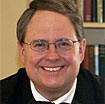Commentary on Mark 3:20-35
Mark 3:19b–35 is among the evangelist’s subtlest intercalations: the insertion of one story inside another, inviting us to hear each as the other’s counterpart. Jesus’ refutation of theological teachers (3:22–30) is sandwiched inside his family relations (3:19b–21, 31–35). In both passages there’s a serious misapprehension of Jesus that reveals fractured households. His family has “come out to seize him, for they were saying, ‘He’s out of his mind’” (verse 21; my translation). Simultaneously, “the scribes who came down from Jerusalem said, ‘He has Beelzebul, and by the ruler of the demons he casts out demons” (verse 22, New Revised Standard Version Updated Edition).
The rupture between Jesus and his mother and brothers is echoed by his reference to “a house … divided against itself” (verse 25). This Markan sandwich leaves a vinegary aftertaste. In 3:28–30 Jesus declares that confusing the Holy Spirit’s agent with unclean spirits amounts to commission of an unforgivable sin. In 3:33–35 Jesus radically redefines members of his family—in antiquity, the most basic social organization—as all who do God’s will.
Return to Mark 3:22–30. Jesus’ response to the accusation that he’s in league with the prince of demons is mysterious. He didn’t flee from his accusers. Instead, “he called them to him and spoke to them in parables” (3:23). Because parables are inherently cryptic (in Hebrew, meshalîm: “shadowy sayings”: Psalm 78:2), Jesus’ reasoning in Mark 3:23b–27 is tricky. The claims made in verses 23b–26 suggest that Satan’s commonwealth is as susceptible to internal instability as are this world’s kingdoms and houses. Accepting the scribes’ premise, Jesus leads them to an awkward position. If they deny what Jesus asserts is the case, they are thrown at odds with the basis of their own accusations. If they accept Jesus’ assertion as just so, they end up agreeing with him, contradicting their own indictment.
Even more perplexing: there’s tension between the reasoning of 3:24–26a, which suggests that Satan’s kingdom has not yet fallen, and the hint in 3:26b that it has. In a roundabout way verse 27 relaxes the stress. Jesus can continue to thwart demonic powers, not because he is in cahoots with them (3:22), but because he has bound Satan. Jesus “has Beelzebul,” not as a collaborator, but under his control—though not entirely so. A portion of the strong man’s house remains inviolate; some aspect of Satan’s enterprise continues. This world is still assaulted by devilish forces, which, tottering now, will ultimately collapse (James 4:7; 1 Peter 5:8–9; Revelation 2:10).
Though all other sins are forgivable, aligning Jesus with demonic forces is a sin that cannot be released (Mark 3:28–30). Why? Mark does not explain. It’s a parable. Here’s my take: Identifying as diabolical the one endowed with God’s holy spirit (1:8, 10) is a peculiar blasphemy, beyond the pale of remission, because one thereby drives oneself away from the true agent of forgiveness (2:5, 10; compare “the deathward sin” in 1 John 5:16–17). To stretch the metaphor in Mark 2:17: we’ll never surrender to therapeutic surgery if we’re so deluded that we think our physician is Hannibal Lecter. To team Jesus with Satan is so utterly perverse that its proponents put themselves under conditions in which forgiveness is a practical impossibility.
Mark 3:31–35 picks up the dangling thread in 3:21—Jesus’ family, who believe he’s deranged. Jesus’ redefinition of family in verses 34–35 is multidimensional. Spatially, it comprises, not family outsiders (verse 31), but those inside who encircle Jesus (3:32). Kinship is based, not on blood, but on doing God’s will (verse 35), which Jesus will demonstrate at Gethsemane (14:36). Jesus’ real family is the faithful church, surrounding him and obedient to their common Father (see 8:38; 13:32; 14:36; cf. Matthew 23:9).
To the relatives identified by the crowd—“your mother and your brothers” (Mark 3:32)—Jesus conspicuously adds “my sister[s]” (3:35), which women in Mark’s own community would surely have heard as referring to them. The identification of family with church would also have consoled early Christians whose confession had ripped apart their own families (10:28–30; 13:12–13). That said, any household—including the church—can become so riven that it caves in. Jesus’ own circle harbored his betrayal from the beginning (3:19).
Let’s give Jesus’ mother and brothers and Jerusalem’s scribes the benefit of the doubt. They all may have wanted, more than anything else, to do God’s will. So may we, in pew and in pulpit. The trap ever before us is to define the kingdom’s boundaries and expect God to abide by our beliefs.
As a child I sang, “Lord, I want to be like Jesus in my heart.” Three bars of that hymn and I’m back in a little brick church in North Carolina, with memory verses and vacation Bible school and cardboard fans tucked behind hymnals by the funeral home—fans, stapled to sticks like tongue-depressors, picturing Jesus holding a lamb. “Lord, I want to be like Jesus.” I meant it then. I mean it now. And yet I know, perhaps knew even then, that in my heart there’s a hardness that really wants Jesus to be like me.
Here’s what Howard Thurman (1899–1981) prayed:
Lord, I want to be more holy in my heart.
Here is the citadel of all my desiring,
where my hopes are born
and all the deep resolutions of my spirit take wings.
In this center, my fears are nourished,
and all my hates are nurtured.
Here my loves are cherished,
and all the deep hungers of my spirit are honored
without quivering and without shock.
In my heart, above all else,
let thy love and integrity envelop me
until my love is perfected and the last vestige
of my desiring is no longer in conflict with thy Spirit.
Lord, I want to be more holy in my heart.1
Notes
- Howard Thurman, Meditations of the Heart (New York: Harper & Row, 1953), 166.


June 9, 2024